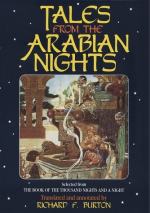[FN#365] I have noted (vols. iii. 75, and viii. 266) that there are two “Soudans” as we write the word, one Eastern upon the Upper Nile Valley and the other Western and drained by the Niger water-shed. The former is here meant. It is or should be a word of shame to English ears after the ungodly murder and massacre of the gallant “Soudanese” negroids who had ever been most friendly to us and whom with scant reason to boast we attacked and destroyed because they aspired to become free from Turkish task-masters and Egyptian tax-gatherers. That such horrors were perpetrated by order of one of the most humane amongst our statesmen proves and decidedly proves one thing, an intense ignorance of geography and ethnology.
[FN#366] [In the Ms. “lawa ’a-hu” for which Sir Richard conjectures the reading “lawwahahu” taking the pronoun to refer to the sword. I believe, however, the word to be a clerical error for our old acquaintance “lawa’a-hu” (see supra p. 203) and, referring the pronoun in the three verbs to the Lion, would translate: “and he worried him,” etc.—st.]
[FN#367] Arab. “Al-basharah,” see vol. i. 30: Scott has (vi. 204) “Good tidings to our sovereign.”
[FN#368] [The Ms. is here rather indistinct; still, as far as I can make out, it runs: “wa Hakki man aulani haza ’l-Mulk"=and by the right of (i.e. my duty towards) Him who made me ruler over this kingdom.—St.]
[FN#369] [The word in the Ms. is difficult to decipher. In a later passage we find corresponding with it the expression “yumazasa-hu fii ’l-Kalam,” which is evidently a clerical error for “yumarasa-hu"=he tested or tried him in his speech. Accordingly I would read here: “yakhburu ma’ahu fi ’l-Kalam,” lit.=he experimented with him, i.e. put him to his test. The idea seems to be, that he first cross-examined him and then tried to intimidate him. With this explanation “yusahi-hu” and later on “yulhi-hu” would tally, which both have about the same meaning: to divert the attention, to make forget one thing over another, hence to confuse and lead one to contradict himself.—St.]
[FN#370] Here we find the old superstitious idea that no census or “numbering of the people” should take place save by direct command of the Creator. Compare the pestilence which arose in the latter days of David when Joab by command of the King undertook the work (2 Sam. xxiv. 1-9, etc.).
[FN#371] The text has “Salasin"=thirty, evidently a clerical error.
[FN#372] [In Ar. “yanjaaru,” vii. form of “jaara” (med. Hamzah), in which the idea of “raising,” “lifting up,” seems to prevail, for it is used for raising the voice in prayer to God, and for the growing high of plants.—St.]
[FN#373] The text, which is wholly unedited, reads, “He found the beasts and their loads (? the camels) and the learned men,” &c. A new form of “Bos atque sacerdos” and of place pour les anes et les savants, as the French soldiers cried in Egypt when the scientists were admitted into the squares of infantry formed against the doughty Mameluke cavalry.




